Peace
Timeline: 2001
Pre-1999
| 1999 | 2000
| 2002
December
24, 2001
The FARC
and Colombian government agree to hold talks, for the first time since
mid-October, on January 3 and 4, 2002. According to a January 3 FARC
communiqué, the talks' purpose is "to find formulas to get
the process moving and to allow for discussion" of the talks' common
agenda [English | Spanish],
a cease-fire, subsidies for the unemployed, the September recommendations
of the "notables commission," and the October "San
Francisco de la Sombra" accord.
- FARC communiqué,
January 3, 2002 [Español]
- FARC communiqué,
December 25, 2001
[Español]
December 15,
2001
|
|
|
Signing
of "Declaration of Havana"
|
In Havana,
Cuba, the Colombian government and ELN guerrillas agree to begin discussions
of a cease-fire during the second week of January, and to hold a series
of thematic meetings in Cuba from January to June. These meetings, to
be attended by a maximum of fifty people, will cover progress and challenges
to the talks (January 30-31), International Humanitarian Law (February
25-27), participatory democracy (March 25-27), agrarian problems, narcotrafficking
and crop substitution (April 29-May 1), energy and mining (May 27-29),
and the economy and social problems (June 24-26).
Two days
later, the ELN announces a unilateral cease-fire for the Christmas holiday
(December 17-January 6).
- "Declaration
of Havana," December 15, 2001 [Español].
- ELN Christmas
truce communiqué, December 17, 2001 [Español].
November
24, 2001
|
|
|
High
Commissioner for Peace Camilo Gómez shakes hands with the
ELN's Ramiro Vargas
|
After
a week of meetings in Havana, Cuba, the Colombian government and ELN
guerrillas agree to re-start negotiations. President Pastrana had broken
off contacts with the group on August 7. The Havana meetings began on
November 18, one week after congress members Antonio Navarro Wolff,
Benjamín Higuita and Luis Fernando Velasco met with ELN leaders
in Venezuela.
According
to the government-ELN "Accord for Colombia," the talks are
to re-start in Havana on December 12, 2001. Topics will include a possible
cease-fire, measures to reduce the conflict, and problems of Colombia's
energy sector.
- [Español]
Text of "Accord
for Colombia," November 24, 2001
November
20, 2001
FARC leader
Manuel Marulanda invites President Pastrana and leaders of business
groups, Colombia's congress, judiciary and Catholic church to a January
15 meeting in the demilitarized zone. The meeting, Marulanda indicates,
would seek to determine "what is negotiable" among a list
of concerns, among them Plan Colombia, drug crop eradication, prisoner
exchanges, and paramilitarism. The meeting would occur five days before
the January 20, 2002 deadline for expiration of the demilitarized zone
where talks are taking place. The Colombian government declared it would
"study" Marulanda's proposal and respond in writing.
- [Español]
Text of Marulanda's
letter, November 20, 2001
November
13, 2001
 |
|
Egeland,
Lemoyne
|
The UN
Secretary-General's special representative for Colombia's peace talks,
Jan Egeland, resigns to head the Norwegian Red Cross. He is replaced
by Egeland's deputy, UNDP official and former New York Times
reporter James LeMoyne.
November
12, 2001
Residents
of the indigenous community of Caldono, Cauca, resist an attempted FARC
takeover of their town by assembling non-violently in the town center.
Similiar examples of non-violent resistance to incursions follow in
several indigenous towns in southwest Colombia. FARC fighters kill some
non-violent resisters in Puracé, Cauca, on December 31, 2001.
- FARC
message to the indigenous communities of southwestern Colombia, August
12, 2001 [Spanish]
November
7, 2001
In a letter
to his group's peace negotiators, FARC leader Manuel Marulanda issues
a set of demands for the restarting of stalled peace talks. These include,
among others, a suspension of government overflights of the demilitarized
zone, a government affirmation that the FARC are not terrorists or narco-traffickers,
an end to military incursions in the zone (the Colombian military denies
any such episodes have occurred), and suspension of the government's
ban on unauthorized foreigners in the zone. If these demands are not
met, Marulanda says, "it will be necessary to agree upon a day
... to officially hand over" the demilitarized zone to the government.
President Pastrana and other government officials reject Marulanda's
"ultimatum."
- [Español]
Letter from Marulanda
to FARC negotiators, November 7, 2001
October
26 , 2001
 |
|
Antioquia
|
Twenty-three
mayors from violence-torn eastern Antioquia department secretly negotiate
a cease-fire with ELN guerrillas. In exchange for a halt to hostilities,
the mayors agree to relocate police stations outside of town centers.
The national government strongly opposes the agreement, and on November
19 the AUC paramilitaries kidnap six of the region's mayors.
- [Español]
Letter from AUC
to Antioquia Governor Guillermo Gaviria, November 19, 2001
October
24-25, 2001
 |
|
Amb.
Patterson with President Pastrana in July
|
In two
speeches, U.S. Ambassador to Colombia Anne Patterson warns that Washington
will seek to extradite guerrilla and paramilitary leaders alleged to
be involved in narcotrafficking, and compares Colombia's armed groups
to Osama bin Laden's Al-Qaeda terrorist organization. "My government
is concerned by the use of the [FARC] demilitarized zone as a base for
terrorist acts," Patterson adds. While she states that "the
United States must do more to combat terrorism in Colombia," Patterson
affirms that "Plan Colombia remains the most effective anti-terrorist
strategy we could design."
- [Español]
Speech by U.S. Ambassador to Colombia Anne Patterson, Bogotá,
Colombia, October 25, 2001
- [Español]
Speech by U.S. Ambassador to Colombia Anne Patterson, Cartagena, Colombia,
October 24, 2001
October
17, 2001
FARC leader
Manuel Marulanda orders his negotiators to stay away from talks with
the Colombian government until the military ceases overflights and alleged
inflitration of the FARC demilitarized zone.
- Letter from Marulanda
to Pastrana, October 25, 2001 [Spanish]
- Memorandum from
FARC negotiators, October 20, 2001 [Spanish]
- Response from
Colombian government to FARC communiqués, October 17, 2001 [Spanish]
- Letter from Marulanda
to FARC negotiators, October 16, 2001 [Spanish]
- Letter from Marulanda
to President Pastrana, October 16, 2001 [Spanish]
- Memorandum from
FARC negotiators to Colombian government, October 15, 2001 [Spanish]
October
15, 2001
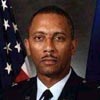 |
|
Taylor
|
Addressing
a press conference at the Organization of American States, State Department
Coordinator for Counterterrorism Francis X. Taylor tells reporters that
the United States will fight hemispheric terrorism using "all the
elements of our national power as well as the elements of the national
power of all the countries in our region." At a House subcommittee
hearing on October 10, Taylor identified the
FARC as "the most dangerous international terrorist group based
in this hemisphere."
October
5, 2001
Days before
the FARC demilitarized zone's next expiration deadline, FARC and Colombian
government negotiators sign the "San Francisco de la Sombra Accord,"
allowing the zone to be renewed until January 20. (FARC negotiators
expressed disappointment that it was not renewed until August, when
President Pastrana's term ends.) The accord commits both sides to focusing
talks on conditions for a cease-fire, and the FARC pledges to cease
its practice of "miracle fishing" -- staging roadblocks and
kidnapping travelers for ransom. The government pledged to increase
anti-paramilitary efforts.
- San Francisco
de la Sombra Accord, October 5, 2001 [English
| Spanish]
September
30, 2001
Soldiers
find the body of Consuelo Araújonoguera, a popular former minister
of Culture and the wife of Attorney-General Edgardo Maya. Araujonoguera
had been kidnapped September 24 by the FARC at a roadblock near Valledupar,
Cesar. The FARC admit the kidnapping but deny the murder, though witnesses
say her guerrilla captors shot her at pointblank range while they were
being pursued by the Army.
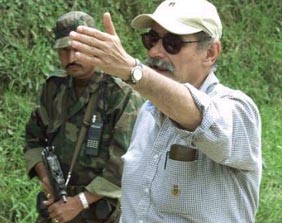 On
September 29, Liberal Party presidential candidate Horacio Serpa was
forced to give up an attempt to lead a protest march into the FARC demilitarized
zone. FARC fighters at the zone's entrance fired warning shots with
rifles and mortars, calling into question the status of the zone just
over a week before its renewal deadline. On
September 29, Liberal Party presidential candidate Horacio Serpa was
forced to give up an attempt to lead a protest march into the FARC demilitarized
zone. FARC fighters at the zone's entrance fired warning shots with
rifles and mortars, calling into question the status of the zone just
over a week before its renewal deadline.
- FARC
communiqué, October 2, 2001 [Spanish]
- FARC
Caribbean Bloc communiqué, October 1, 2001 [Spanish]
- FARC
Southern Bloc communiqué, September 12, 2001 [Spanish]
September
19, 2001
The "notables
commission" created on May 11 to find solutions to the paramilitary
problem issues a report recommending that the
government-FARC talks proceed under a six-month cease-fire. Under the
proposed agreement, the FARC would abstain from kidnappings and extortion,
while the government would pay for the FARC members' basic needs and
refrain from fumigating small-holding coca-growers.
- "Propuestas
concretas de las FARC-EP al gobierno de Pastrana para agilizar el
Proceso de Paz," letter from Marulanda to Pastrana, September
12, 2001 [Spanish]
- Communiqué
#30 from negotiators, September 7, 2001 [Spanish]
- Letter
from FARC negotiators to government negotiator Camilo Gómez,
August 22, 2001 [Spanish]
August 13,
2001
 The
Colombian government arrests three suspected members of the Irish Republican
Army in the Bogotá airport. James Monaghan, Martin McCauley and
David Bracken are accused of spending five weeks in the FARC demilitarized
zone, offering training in urban terror tactics. The
Colombian government arrests three suspected members of the Irish Republican
Army in the Bogotá airport. James Monaghan, Martin McCauley and
David Bracken are accused of spending five weeks in the FARC demilitarized
zone, offering training in urban terror tactics.
August
7 , 2001
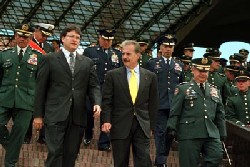 In
a speech before the army, President Pastrana announces that he is cutting
off all talks with the ELN guerrillas. Pastrana blames the group's stubbornness
in insisting on a paramilitary-free demilitarized zone in San Pablo
and Cantagallo municipalities, in southern Bolívar department. In
a speech before the army, President Pastrana announces that he is cutting
off all talks with the ELN guerrillas. Pastrana blames the group's stubbornness
in insisting on a paramilitary-free demilitarized zone in San Pablo
and Cantagallo municipalities, in southern Bolívar department.
- Pastrana
speech, August 7, 2001 [Spanish]
- ELN
response, August 8, 2001 [Spanish]
- Paramilitary
(AUC) letter to ELN, August 8, 2001 [Spanish]
July
31, 2001
The
Pastrana government names a new team of negotiators (Now called "consultants")
for its talks with the FARC. The four so-called "consultants"
are Manuel Salazar, the president's advisor for social policy; Ricardo
Correa, secretary-general of the National Association of Industries (ANDI,
one of Colombia's main business associations); Reinaldo Botero, coordinator
of the government's human rights program; and Luis Fernando Criales, the
assistant high commissioner for peace for the FARC peace talks.
July 15-16,
2001
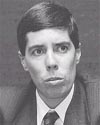 |
| Alan
Jara |
Two FARC
kidnappings anger the international community and slow the pace of the
peace talks. On July 15, FARC guerrillas in Meta department kidnap the
department's former governor, Alan Jara, while he was traveling in a
clearly marked United Nations vehicle. A FARC statement issued later
accuses Jara of paramilitary ties, criticizes the UN for transporting
him, and promises to submit the former governor to a "popular tribunal."
On July 16, the FARC kidnaps three German development workers in Cauca
department, demanding an end to fumigations in the zone (which had started
the day before). The United Nations and European Union issue strong
protests, amid speculation that the guerrillas' actions will affect
international support for the peace process.
- FARC statement
on Jara kidnapping, July 19, 2001 [Spanish]
- FARC statement
on German citizens' kidnapping, October 11, 2001 [Spanish]
- FARC statement
on German citizens' kidnapping, August 24, 2001 [Spanish]
July 7,
2001
Queen
Noor of Jordan and America Online founder James Kimsey visit the demilitarized
zone for a meeting with Manuel Marulanda and High Commissioner for Peace
Camilo Gómez.
June
28, 2001
 The
FARC unilaterally releases 242 soldiers and police agents it has held prisoner
for months, in most cases for years. The group threatens to increase its
kidnappings, however. FARC leader Jorge Briceño ("El Mono Jojoy")
told the prisoners, "We have to grab people from the Senate, from Congress,
judges and ministers, from all the three powers (of the Colombian state),
and we'll see how they squeal." The
FARC unilaterally releases 242 soldiers and police agents it has held prisoner
for months, in most cases for years. The group threatens to increase its
kidnappings, however. FARC leader Jorge Briceño ("El Mono Jojoy")
told the prisoners, "We have to grab people from the Senate, from Congress,
judges and ministers, from all the three powers (of the Colombian state),
and we'll see how they squeal."
FARC
communiqué [Spanish]
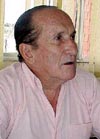 The
public-relations impact of the release is further dulled by the group's
kidnapping of Hernán Mejía Campuzano (right), vice-president
of the Colombian Soccer Federation. Though Mejía was not kidnapped
because of his position -- the guerrillas released him on June 29 -- the
crime proved likely to force the Copa América soccer tournament,
scheduled to begin in mid-July in Colombia, to relocate to another country. The
public-relations impact of the release is further dulled by the group's
kidnapping of Hernán Mejía Campuzano (right), vice-president
of the Colombian Soccer Federation. Though Mejía was not kidnapped
because of his position -- the guerrillas released him on June 29 -- the
crime proved likely to force the Copa América soccer tournament,
scheduled to begin in mid-July in Colombia, to relocate to another country.
June
23, 2001
FARC militias
attack the La Picota prison in southern Bogotá, freeing 98 prisoners,
including several FARC and ELN members.
June 5,
2001
The FARC releases
police Col. Alvaro León Acosta and three other officers, the beginning
of compliance with a prisoner exchange agreement. Under the June 2 accord,
the FARC will free 42 sick military and police personnel in exchange for
15 ailing guerrillas in government prisons.
March 30,
2001
Pastrana pulls
troops from 1,120 sq. mile zone in northern Colombia to create safe haven
for ELN and act as a site for direct rebel-government negotiations.
March 23,
2001
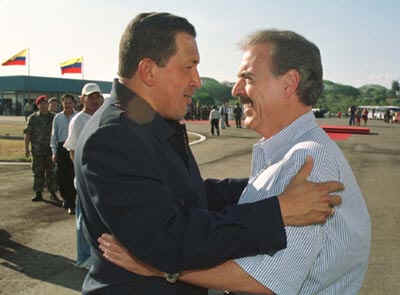 Pastrana
meets with Venezuelan President Chavez to address strained diplomatic
ties due to Venezuelan military exercises and the botched extradition
of an ELN guerrilla hijacker captured in Caracas. Venezuela
denied supporting guerrillas and diplomatic ties were "put on
a fresh footing". Pastrana
meets with Venezuelan President Chavez to address strained diplomatic
ties due to Venezuelan military exercises and the botched extradition
of an ELN guerrilla hijacker captured in Caracas. Venezuela
denied supporting guerrillas and diplomatic ties were "put on
a fresh footing". |
|
February
27, 2001
Pastrana
met with President Bush a day after a State Department report
blasts human rights situation in Colombia. Bush agreed to
strengthen trade with Colombia, but refused Pastrana's call for
a U.S. role in peace negotiations with the FARC.
|
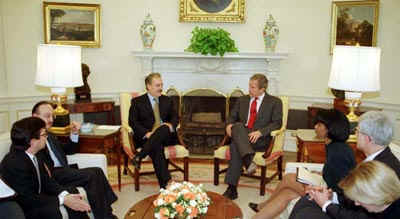 |
February
8-9, 2001
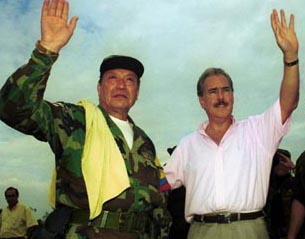 President
Pastrana stays overnight in the FARC demilitarized zone between two days
of meetings with FARC leader Manuel Marulanda. The leaders emerge with a
deal to revive peace talks, the 13-point "Pact
of Los Pozos." Pastrana
and Marulanda agree to extend the demilitarized zone for another 8 months,
and to negotiate a prisoner exchange and a possible ceasefire. The Pact
creates a 3-panel advisory group that will report on the paramilitary and
guerilla terrorism problem, side issues that could threaten the peace process,
and conditions in the demilitarized zone. The language of the pact was often
ambiguous, but increased optimism about the peace talks' future. President
Pastrana stays overnight in the FARC demilitarized zone between two days
of meetings with FARC leader Manuel Marulanda. The leaders emerge with a
deal to revive peace talks, the 13-point "Pact
of Los Pozos." Pastrana
and Marulanda agree to extend the demilitarized zone for another 8 months,
and to negotiate a prisoner exchange and a possible ceasefire. The Pact
creates a 3-panel advisory group that will report on the paramilitary and
guerilla terrorism problem, side issues that could threaten the peace process,
and conditions in the demilitarized zone. The language of the pact was often
ambiguous, but increased optimism about the peace talks' future.
February
3, 2001
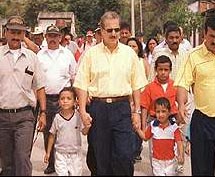 Pastrana
pays a brief visit to the FARC demilitarized zone to speak with residents. Pastrana
pays a brief visit to the FARC demilitarized zone to speak with residents. |
January
31-February 2, 2001
On the eve
of a new deadline for the FARC demilitarized zone, President Pastrana extends
the zone for four more days, asking for a face-to-face meeting with FARC
leader Manuel Marulanda. Marulanda accepts a meeting on February 8.
January
23, 2001
The FARC rejects
a Colombian government proposal for re-starting the talks, which had called
for an end to kidnappings and the guerrillas' use of homemade bombs.With
a January 31 deadline for renewal of the demilitarized zone approaching,
the Colombian Army announces that 600 counter-guerrilla troops have been
airlifted to sites near the zone. "If Manuel Marulanda wants an extension
of the safe haven, he has to sit at the negotiating table," President
Pastrana said.
January
11, 2001
The Colombian
government announces new measures to rein in paramilitary groups. Human
rights groups are generally skeptical, citing similar past commitments that
went unfulfilled.
January
10, 2001
Reports indicate
that the FARC may release 100-150 soldiers and police officers in its custody
by the middle of February. A car bomb went off in a busy shopping mall parking
lot in Medellín; though none claim responsibility, many blame it
on an feud between paramilitaries and a powerful Medellín gang. The
Colombian military rescues the ELN's fifty-six hostages.
January
7, 2001
The two-year
anniversary of the FARC peace talks passes in a moment of pessimism, with
dialogues frozen since mid-November.
Pre-1999
| 1999 | 2000 | 2002
|


 The
FARC unilaterally releases 242 soldiers and police agents it has held prisoner
for months, in most cases for years. The group threatens to increase its
kidnappings, however. FARC leader Jorge Briceño ("El Mono Jojoy")
told the prisoners, "We have to grab people from the Senate, from Congress,
judges and ministers, from all the three powers (of the Colombian state),
and we'll see how they squeal."
The
FARC unilaterally releases 242 soldiers and police agents it has held prisoner
for months, in most cases for years. The group threatens to increase its
kidnappings, however. FARC leader Jorge Briceño ("El Mono Jojoy")
told the prisoners, "We have to grab people from the Senate, from Congress,
judges and ministers, from all the three powers (of the Colombian state),
and we'll see how they squeal."
 The
public-relations impact of the release is further dulled by the group's
kidnapping of Hernán Mejía Campuzano (right), vice-president
of the Colombian Soccer Federation. Though Mejía was not kidnapped
because of his position -- the guerrillas released him on June 29 -- the
crime proved likely to force the Copa América soccer tournament,
scheduled to begin in mid-July in Colombia, to relocate to another country.
The
public-relations impact of the release is further dulled by the group's
kidnapping of Hernán Mejía Campuzano (right), vice-president
of the Colombian Soccer Federation. Though Mejía was not kidnapped
because of his position -- the guerrillas released him on June 29 -- the
crime proved likely to force the Copa América soccer tournament,
scheduled to begin in mid-July in Colombia, to relocate to another country.
 President
Pastrana stays overnight in the FARC demilitarized zone between two days
of meetings with FARC leader Manuel Marulanda. The leaders emerge with a
deal to revive peace talks, the 13-point "Pact
of Los Pozos." Pastrana
and Marulanda agree to extend the demilitarized zone for another 8 months,
and to negotiate a prisoner exchange and a possible ceasefire. The Pact
creates a 3-panel advisory group that will report on the paramilitary and
guerilla terrorism problem, side issues that could threaten the peace process,
and conditions in the demilitarized zone. The language of the pact was often
ambiguous, but increased optimism about the peace talks' future.
President
Pastrana stays overnight in the FARC demilitarized zone between two days
of meetings with FARC leader Manuel Marulanda. The leaders emerge with a
deal to revive peace talks, the 13-point "Pact
of Los Pozos." Pastrana
and Marulanda agree to extend the demilitarized zone for another 8 months,
and to negotiate a prisoner exchange and a possible ceasefire. The Pact
creates a 3-panel advisory group that will report on the paramilitary and
guerilla terrorism problem, side issues that could threaten the peace process,
and conditions in the demilitarized zone. The language of the pact was often
ambiguous, but increased optimism about the peace talks' future.